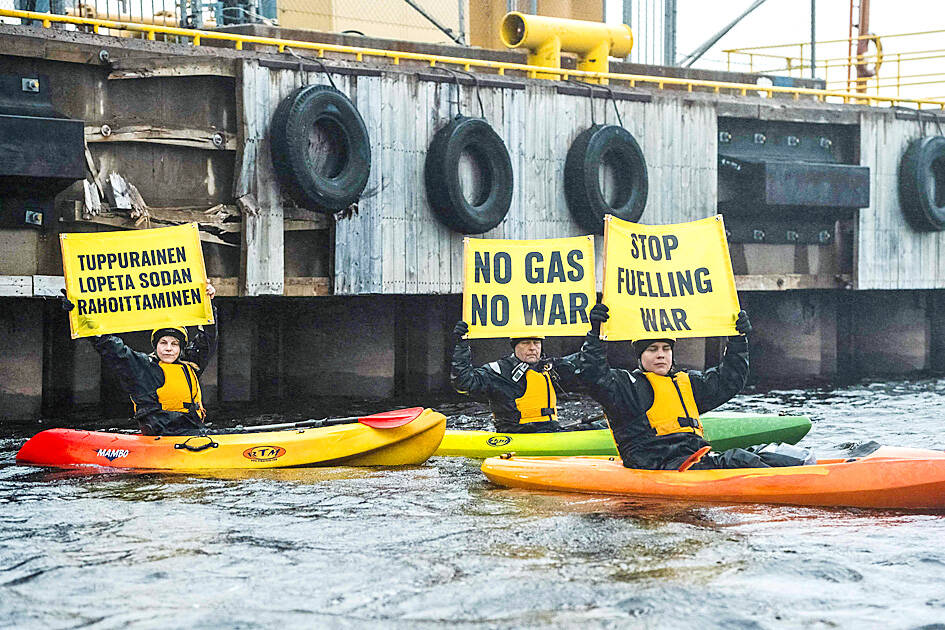Greenpeace and a raft of other environment groups yesterday issued the EU an ultimatum over its decision to grant some gas and nuclear power stations a “fake” green label under the bloc’s sustainable finance rules.
Eight Greenpeace organizations across Europe, as well as nonprofits ClientEarth, WWF, Transport & Environment and BUND have demanded a review of the decision to include gas and nuclear power in the EU’s green rulebook, known as the taxonomy.
The European Commission has until February to reply, or the groups said they would take the case to the European Court of Justice.

Photo: AFP / Antti Yrjonen / Greenpeace
“Gas is a leading cause of climate and economic chaos, while there is still no solution to the problem of nuclear radioactive waste and the risk of nuclear accidents is far too significant to ignore,” Greenpeace EU sustainable finance campaigner Ariadna Rodrigo said. “This fake green label is incompatible with EU environment and climate laws.”
The complaint is that channeling money to gas projects — albeit with strict conditions attached — is not compatible with the EU’s climate neutrality goal, which is enshrined into law, and the Paris Agreement.
The non-government organizations say that it would take money away from renewable sources of electricity such as wind and solar. Greenpeace highlighted the waste from nuclear power, as well as the long time needed to construct new facilities.
Last week, five nonprofits announced they would leave the EU Platform on Sustainable Finance, which provides technical advice to the EU Commission in protest over the taxonomy.
Austria and Luxembourg are also in the process of taking legal action against the decision, which would enter into force in the New Year after a last-ditch vote on an objection in the European Parliament in July was rejected.

Asian perspectives of the US have shifted from a country once perceived as a force of “moral legitimacy” to something akin to “a landlord seeking rent,” Singaporean Minister for Defence Ng Eng Hen (黃永宏) said on the sidelines of an international security meeting. Ng said in a round-table discussion at the Munich Security Conference in Germany that assumptions undertaken in the years after the end of World War II have fundamentally changed. One example is that from the time of former US president John F. Kennedy’s inaugural address more than 60 years ago, the image of the US was of a country

BLIND COST CUTTING: A DOGE push to lay off 2,000 energy department workers resulted in hundreds of staff at a nuclear security agency being fired — then ‘unfired’ US President Donald Trump’s administration has halted the firings of hundreds of federal employees who were tasked with working on the nation’s nuclear weapons programs, in an about-face that has left workers confused and experts cautioning that the Department of Government Efficiency’s (DOGE’s) blind cost cutting would put communities at risk. Three US officials who spoke to The Associated Press said up to 350 employees at the National Nuclear Security Administration (NNSA) were abruptly laid off late on Thursday, with some losing access to e-mail before they’d learned they were fired, only to try to enter their offices on Friday morning

Cook Islands officials yesterday said they had discussed seabed minerals research with China as the small Pacific island mulls deep-sea mining of its waters. The self-governing country of 17,000 people — a former colony of close partner New Zealand — has licensed three companies to explore the seabed for nodules rich in metals such as nickel and cobalt, which are used in electric vehicle (EV) batteries. Despite issuing the five-year exploration licenses in 2022, the Cook Islands government said it would not decide whether to harvest the potato-sized nodules until it has assessed environmental and other impacts. Cook Islands Prime Minister Mark Brown

STEADFAST DART: The six-week exercise, which involves about 10,000 troops from nine nations, focuses on rapid deployment scenarios and multidomain operations NATO is testing its ability to rapidly deploy across eastern Europe — without direct US assistance — as Washington shifts its approach toward European defense and the war in Ukraine. The six-week Steadfast Dart 2025 exercises across Bulgaria, Romania and Greece are taking place as Russia’s invasion of Ukraine approaches the three-year mark. They involve about 10,000 troops from nine nations and represent the largest NATO operation planned this year. The US absence from the exercises comes as European nations scramble to build greater military self-sufficiency over their concerns about the commitment of US President Donald Trump’s administration to common defense and